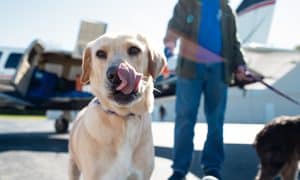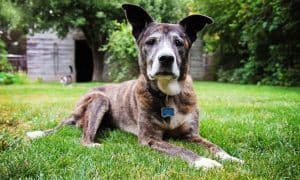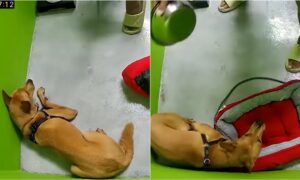“This post contains affiliate links, and I will be compensated if you make a purchase after clicking on my links.”
Your dog is aging and he isn’t acting normal. You aren’t sure whether he’s just getting old and cranky or if something’s really wrong. It could be either one, but here are some common behavioral changes in old dogs, courtesy of My Old Dog. If your old dog is exhibiting any of these signs, rest assured it is common.
Common Behavioral Changes In Old Dogs
Some of the signs of an elderly dog are physical signs and some are behavioural but one thing is common for both of them – a general slowing down. It has been found that in a young dog messages travel along the nervous system at about 6000m per second but in the elderly dog this slows to about 1300m per second. This along with arthritis can make a noticeable difference to your dog and is the biggest change that I have noticed in my own old dog, Pippa. When she was young she was extremely quick in every way but now her responses are much slower.
Sleep becomes a much more common pastime which together along with hearing loss can make your once alert guard dog become a very poor one! We now find that we can walk into our house and Pip will be fast asleep somewhere oblivious to our entrance. If she does wake up she often can’t be bothered to get off her cosy bed! It is a similar story in the morning when I get up from a nights sleep. When Pip was younger she would be there waiting excitedly, tail wagging furiously, ready to go out for a walk. Now she rarely bothers to get off her bed when I come down.
You may find your dog tires more on walks and lags behind. I found that my dog Pippa now lags behind and I have to sometimes shout and encourage her to keep with me. This can be an area of concern because of another sign – mental confusion in the old dog and the fact that they could get disoriented and lost if you are not careful.
Your dog might seek more time on her own away from everyone else. I have noticed this with my children and Pippa, especially if they are being noisy which is why I ask them not to go anywhere near her bed and to give her space when she is resting.
Older dogs eyes take on a distinct older look in general just like humans do and their eyes reflect light more at night. This is due to changes in the eye as they age. Their near vision can often deteriorate but their long vision usually remains excellent.
Sometimes the senior dog may have incontinence issues. They may want to be let out of the house more frequently to go to the toilet.
You might notice that your old dog starts to get confused sometimes. Sometimes they might bark at things that they have never bothered about before, get a bit lost with familiar directions or try and exit through a door at the wrong side.
Your old dog may also start to pant more, especially in hot weather as they find it harder to regulate their body temperature. Likewise in winter they can feel the cold more, especially if they have a short coat, and can benefit from a special dog coat.
Additionally, regarding panting, I have found that it can be a sign that my old dog is in pain when she pants. This is not panting when she has been exercising or is hot. It is usually when she gets up to move after lying down for a length of time and her joints obviously pain her.
These are just a few of the more common signs of an elderly dog that can be noticed. Only you know your dog as well as you do and I am sure there will be others that you will notice too.
If your old dog’s behavior is something other than these common behavioral changes in old dogs, it might be a health-related issue. My Old Dog also addresses those. If your worries continue, call your vet. Have you experienced any other behavioral changes in your dog? Please share them below to help fellow dog owners know what to expect as their loyal companion ages.



















Patricia Williamson
Dec 10, 2018 at 8:04 am
My 9yr.old Border Collie has become sensitive to my movements,however slight my movements are ,she gets up quickly to move away from me…looking back at me.She makes no sounds,is not aggressive when this behavior occurs.This behavior will happen when she is moving or laying down.Vet.says nothing to do,just old dog.Anyone know if there’s anything I CAN DO for my dog?Thank You.
Sheila
Apr 14, 2017 at 6:22 pm
My dog Trouble a beautiful 9 year old Staffie has always slept on my bed but the last two weeks has not bothered and stays on the settee I am worried about him and wonder why any suggestions why. He's still very playful and loves hos walks.
Jackie Logan
Jan 3, 2016 at 7:00 pm
We have a 12 year old English bulldog. He has heart issues, arthritis. He still eats well and still goes outside to potty. He has had a few accidents. A behavior problem that we have seen is he lays and growls or moans or snorts. Then proceeds to bark, even if we are in the room. He has also become snappy if one of our other dogs get around him. Therefore we monitor when all the other dogs are close by. He has problems going up and down stairs, so we carry him. My husband carries him more than I. He is still a great dog and loves attention. He still seems happy because he gets in the floor and rolls and rolls.
Lana
Jul 13, 2015 at 9:06 pm
I have a 13 year old Mini Aussie. She now has no interest in going outside, likes to sleep a lot, and is suddenly an extremely picky eater. She either gets what she likes (cooked chicken, cooked hamburger) or she will not eat at all. She has lost a lot of weight due to her pickiness. I take her outside even if she does not like it, she walks very slowly then looks around and runs back in. I have noticed her wandering around the house amisely, hiding under the counter, and hiding under my bed. She does not do anything she used to like to do like go to the dog park, ride in the car, and walk to the park. She does not seem to get happy when I get home, just lie on her blanket. She has been to the vet twice. We tried to give meds to increase her appetite, but the only made her more nervous. She still likes to be petted. This is so sad to see her decline. I have had her since she was a puppy. Any comments would be appreciated.
Carolyn
Apr 9, 2015 at 8:51 am
My 8 year old Japanese Chin who really never liked to be outside much besides his 2 daily walks lately seems to won’t to be out in the yard often. When he comes back to the door as if he wants to come back in and I open it , he turns around quickly and goes back. He will do this several times.hes not going out to urinate or have a bowel movement. He just sniffs around and stands out there. Very odd behavior for him any comments would be apprecuated6.
Fred S.
Sep 16, 2019 at 5:36 pm
Hello, I just read a post you had from 2015. I was wondering if you ever found out why your dog was acting like it was. I am asking because my 12 year old dog is acting exactly the way you described in your post and I can’t find a reason other than senility. Thank you.
Mike
Oct 27, 2014 at 10:49 am
Our dog, Lucky, is a female lab/shepherd mix that is now over 14 years old (she’s a rescue, so we’re not completely certain). She has been having increasing problems walking, which seems to be more than arthritis. It seems to be related to some loss of feeling or control in her hind quarters, lower spine. She also seems to have lost some of her hearing and near vision. We’ve taken her to the vet multiple times for all kinds of tests, cold laser treatments and anti-inflammatory injections, but there was no significant change or concrete diagnosis.
We tried changing her diet to a raw food diet for a while, but at a certain point she wouldn’t eat it anymore. So we switched her back to her Wellness canned and dry food, and she continues to like that. We also had her on what seemed like every canine pharmaceutical it seemed, from anti-inflammatory medications like Rimadyl to opiate pain killers, but that actually seemed to make her more lethargic and depressed. It also seemed to make her loose the ability to hold her urine. After reading about the negative side effects of these medications, we decided to take her off them completely and to just use as many holistic supplements as possible. So we give her glucosamine, Cosequin, chondroitin, msm, and various other joint and health supplements. She actually seems better on this regimen.
Lucky was having real problems with her bowels, often going in the house without seeming to be aware of it. So in the spirit of “what I wouldn’t do for my dog”, we figured out how to make her go by using a cotton swab. I won’t go into detail here! As long as we do this at regular intervals during the day and before bedtime, it makes her eliminate and keeps the accidents to a minimum. When she started having problems urinating and was wetting herself in her sleep we figured out a way to make her go more regularly by massaging her belly. So now we do these two things at the same time, and that’s put an end to the accidents. Every once in a while a poop falls out, but it’s a fairly minor problem (if not a little embarrassing around company).
Now she’s started lying half in and half out of her bed, which looks really odd. She’s often contorted in what looks to be a really uncomfortable position. Often, I’ll go and re-adjust her, and then she looks more peaceful. Rather than lying on a rug as she often did, she will lie on a cold stone or tile floor. I’m thinking it might feel good on her joints.
Lucky often seems like she doesn’t want to be touched, and will flinch, but that’s only if you move towards her too quickly. I think that might be a function of deteriorating eyesight. She also seems to have a problem eating her canned food. She can’t seem to pick it up and chews with her head tilted to the side slightly. It’s as if her tongue isn’t working right. So I’ve started feeding her by hand.
At night, she was pacing endlessly, so we started putting a little enclosure around her bed at night, and that seems to have put an end to it.
So pretty much everything is done by hand now: eating, pooping, peeing, and sleep positioning. But she seems to enjoy food, will get up and move to be in the same room as us. She walks so stiffly like a little tin soldier, but she is able to get around. So we hope we are doing the right thing, waiting to put her down. I’m curious to see if anyone else has had to do a lot of these things for their aging dog and what your readers think about when it’s time to put an old dog to sleep.
Robyn
Oct 22, 2013 at 7:58 pm
My Blue Heeler will be thirteen in February. Since I got her at 2 1/2 years old, her behaviour has been more than pleasant and more importantly, consistent. However, since September (the past two months), she has been acting strangely. She has stopped sleeping in the bed with me at nighttime and prefers to sleep by herself in the living room on the couch, where she’ll now stay all night long. She has begun pulling and tugging during her walks where before, she was calm and alert. If I have guests over and I leave with them, she will howl until my neighbour goes to check on her– she’s not a barker. Even her food habits have changed; where she was eating two solid meals per day, I’m lucky if I can get her to eat one (even though I continue to put food down twice) and even then, she may only eat it if she is hand-fed. She has no troubles moving around, people at the dog park cannot believe her age when I tell them, and her vision and hearing are as they should be. I’m still not sure what is causing these behavioural issues and it is concerning at the least.
Bernadette Bailey
Oct 7, 2013 at 11:05 pm
My dog Hector was adopted by us on Petsmart adoption day, at the age of 1-2 yrs by the Veternarian’s estimation. That was in 2001. He now sleeps alot and refuses to come to me. He is happy when being held and after a gentle bath feels best. He is on pain med for a crippled leg which was a birth defect so the breeder just dumped him at the SPCA coz he wasn’t “perfect”. He loves to lay in the warm sun. My “imperfect” dog is an angel. Never would hurt any living thing. Loves to lay on the porch and watch butterflies, tiny frogs go by…never bothering, only watching. I love him so much. Robbies home remedies for animals helped alot. I have the ability to figure out how to help his pain without the Vet not caring that I am disabled and cannot buy him a new Mercedes, you know? My Hector is crankier and when he barks due to crankiness with other playful pups in the family, I take a very tiny tiny chip of my med which is also used for dogs, and he then gets up, wagging his tail and actually enjoying his day. He must use super moist dog food and a drizzle of olive oil daily over it cures his ongoing constipation issues now for good and he is also colder. Old dogs can be a joy still and love tender cuddles.